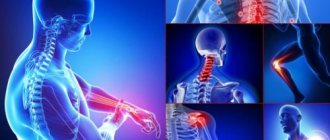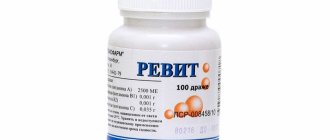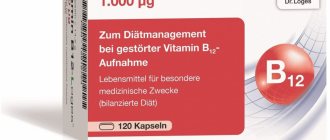B vitamins: side effects
Before the formula was figured out, vitamins were called letters of the Latin alphabet as they were discovered: A, B, C, D, and so on. Now they have rational names based on their chemical structure. Vitamin A is retinol, vitamin K is phylloquinone, vitamin B2 is riboflavin, vitamin PP is nicotinic acid, etc. But in the old fashioned way we call them “A”, “Be” and “Tse”... How could it be otherwise, because vitamins are our old friends! But how well do we know them?
They say that every doctor has his own “favorite” drugs. This is true. The doctor knows some medications better, prescribes them first and sometimes takes them himself. And each doctor has his own favorite vitamins, which he will most likely recommend to you.
But then we come to the pharmacy - and our eyes widen. They offer a sea of vitamins in beautiful jars with bright labels! Entire shelves are occupied by them. But the doctor insisted on one single drug... Isn’t it better to buy THIS and THAT? Maybe the doctor hasn’t looked at the reference books for a long time? And the hand reaches out to the magic pills that catch your fancy.
But, wait, let's remember what the doctor advised. Do you know which vitamins doctors love especially dearly? Of course, B vitamins.
Why are they so popular with doctors?
The thing is that great hopes were placed on them in the eighties of the last century: it was believed that B vitamins reduce the level of homocysteine in the blood - an amino acid, the high level of which is directly related to heart and vascular diseases. Many studies have been conducted in different countries, and as a result, the effectiveness of these vitamins was considered ambiguous: “50 to 50.” Indeed, when patients take more effective medications, “vitamins” play only a supporting role. But doctors continue to prescribe them for various cerebrovascular pathologies (diseases of the blood vessels of the brain). Additional help for the body is not a hindrance, right?
Yes, modern, effective and inaccessible to most patients due to their high price, drugs act much faster. And of course, “vitamin therapy” is not so effective. But almost all drugs have a “dose-dependent” (the higher the dosage, the better) and a “chrono-dependent” (the longer the drug is taken, the longer the positive dynamics persist) effect.
At the same time, the undeniable advantage of vitamins is the price. When prescribing a drug, a doctor can be sure that the medicine will be taken as long as needed and will not empty the patient’s wallet. Many doctors, when prescribing group B, focus on this.
Get to know everyone by sight
You know the basic B vitamins for sure. These are the well-known B1, B6 and B12:
- B1
– (thiamine) actively participates in metabolism, restores peripheral nerve endings that regulate the functioning of the liver and heart. - B6
– (pyridoxine) strengthens the immune system, has a beneficial effect on skin diseases, and restores the nervous system. According to some data, 80 mg of vitamin B6 per day reduces the risk of myocardial infarction by 32%. - B12
– (cyanocobalamin) has a beneficial effect on the function of the liver and nervous system, and is involved in the restoration of metabolism. Vitamin B12 is effective in treating chronic fatigue syndrome in 50–80% of people.
But their less famous brothers deserve attention too.
- B2
– (riboflavin) participates in metabolism, strengthens the respiratory system, improves vision, cures skin diseases, and has a beneficial effect on the functioning of the nervous system. - B3
– (nicotinic acid) cures pellagra, improves water-salt metabolism, improves metabolism in the cells of the nervous tissue. - B9
- (folic acid, folacin, vitamin Bc) is extremely important for the development of the brain and nervous system of the fetus, it is also needed for the development of a breastfed child, and for adults, primarily for the normal functioning of the nervous system.
Do you get the general idea? Right! B vitamins are essential for diseases of the nervous system. Which of us has “nerves” in order? Now my head hurts, now my irritability has increased, now my back is “shot”, now I have problems with my memory...
B vitamins are called “neurotropic” because of their effect on the function of nerve cells. Some studies have shown high activity of this group in terms of pain relief in chronic pain syndromes and increasing the pain threshold in acute pain. Currently, more than a hundred studies have been published showing clinical improvement with the use of B vitamins in patients with pain syndromes.
When do B vitamins help?
Vitamins of this group are especially often prescribed to patients with back pain. Once you see a doctor with the complaint of “your back is stuck,” “shot in the air,” or “arm/leg is numb,” a prescription with the treasured trinity (B1+B6+B12) will be in your hands. Why? Because it has been repeatedly proven that it is these “magic” vitamins that influence nerve cells coming from sensitive receptors to the brain, as if “inhibiting” pain impulses.
If the nerve fiber itself, consisting of hundreds and thousands of processes of neurons (nerve cells), is damaged, then their successful “restoration” requires the same vitamins that work, laying proteins like bricks to recreate the fiber shell.
However, many neurologists remain skeptical about their therapeutic potential, believing that in many cases there is a placebo effect. The fact is that no one has ever been able to achieve a 100% effect in treatment when prescribing vitamins alone. Therefore, if you have back pain, consult a doctor, he will select the right combination of medications for you, including the B-complex.
In 2000 and 2002, the American Psychiatric Association published research in the American Journal of Psychiatry showing the effect of vitamin B12 deficiency on the occurrence of clinical depression in elderly patients. For many of them, antidepressants were not indicated, so vitamin complexes paired with diet and exercise gave good results. Given these data, many doctors began to actively prescribe B-complexes for the treatment of depression and achieve results.
Other studies have shown that pregnant women consuming foods rich in folic acid or taking adequate doses of folic acid and vitamin B12 significantly reduce the risk of developing neural tube defects. This is also the “gold standard” of pregnancy management throughout the world.
B1 deficiency also plays a big role in the development of alcoholic polyneuropathy, which in Russia is one of the most common forms of generalized damage to peripheral nerves.
The only questionable purpose of this group is still asthenic conditions, such as the notorious “chronic fatigue syndrome”. Too many diseases can be hidden under the guise of this seemingly innocent diagnosis. The man is tired... stress, lack of sleep and irregular nutrition have taken their toll. Take some vitamins and everything will go away? And they drink! Handfuls and kilograms!
...And we face the risk of overdose
When consuming excessive doses (three or more times the recommended daily intake) of B vitamins, intoxication develops. Hypervitaminosis of vitamins B1, B2 and B6 can cause fatty liver. Among the elements of group B, the most toxic are B6 and B12. And allergic reactions are observed mainly with their excess, as well as with an overdose of vitamins B1 and B2.
Thus, an excess of vitamin B1 causes symptoms in the form of allergic reactions and spasmodic headaches. Blood pressure decreases, fever, weakness, nausea appear, vomiting may occur, chills are replaced by a feeling of heat, tinnitus bothers you, severe sweating and dizziness appear.
With prolonged use of vitamin B6 in excess dosages, anemia develops, coordination of movements is impaired and numbness of the limbs appears.
Excess vitamin B12 leads to heart failure, pulmonary edema, vascular thrombosis due to increased blood clotting and anaphylactic shock. The heartbeat quickens, pain appears in the heart area, nervous disorders intensify, and allergic rashes appear on the skin in the form of hives.
As you can see, caution is needed even with such seemingly harmless drugs as vitamins. Therefore, it is best to consult a doctor for advice. And he will definitely tell you everything he knows about his “favorite” vitamins.
Valentina Saratovskaya
Photo thinkstockphotos.com
Products by topic: (vitamins)
Pyridoxine: what kind of vitamin?
The main role of the vitamin is to take part in protein metabolism. In addition, pyridoxine is necessary for carbohydrate and fat metabolism in the human body. Helps maintain the balance of potassium and sodium, which is especially important for the central nervous system, and stabilizes muscle function. If there is a lack of vitamin in the body, inflammatory processes in the middle ear may begin.
It is worth keeping in mind that pyridoxine is negatively affected by sunlight, water and high temperatures. Therefore, products that contain the vitamin should not be boiled or heat-treated.
References
- Severin, E.S., Aleynikova, T.L., Osipov, E.V. and others. Biological chemistry. - M.: Medical Information Agency LLC, 2008. - 364 p.
- Biological chemistry: Textbook. — 3rd ed., revised. and additional - M.: Medicine, 1998. - 704 p.
- Shendrik, L.M., Vasilyeva, I.A., Kovalenko, A.N. and others. The use of B vitamins in the complex treatment of patients with diseases of the digestive system. - Gastroenterology, 2021. - pp. 73-77.
- Larry, J. Vitamin B6 Deficiency and Dependency. —MSD Manual, 2020.
Indications for use
Vitamin B6 is often prescribed for the following conditions and problems:
- toxicosis during pregnancy;
- premenstrual period;
- diseases of the central nervous system, mental disorders;
- acute and chronic gastritis;
- anemia;
- skin diseases;
- in order to prevent negative effects as a result of taking various medications.
An acute lack of vitamin is observed in alcoholism and taking oral contraceptives.
Overdose symptoms
Vivid symptoms of an overdose of vitamin B6 appear when consuming 500 mg. They manifest themselves as changes in the brain in the form of vivid dreams that are well remembered. Long-term intake of lower amounts of B6 may cause the following symptoms of hypervitaminosis:
- headaches, difficulty concentrating;
- feeling of numbness and tingling in the legs and arms;
- the occurrence of dermatitis;
- peeling of the skin;
- circulatory disorder;
- hand trembling;
- burning sensation in the lips;
- allergic reactions;
- convulsions that occur at night;
- increased stomach acidity;
- movement coordination disorder;
- decreased milk supply in nursing mothers.
Exceeding the norm
The daily requirement of B6 depends on the age and gender of the person. For adults, it averages two milligrams.
| Category | Normal requirement for B6, mg |
| Children under three years old | 1,0 |
| Children under ten years of age | 1,6 |
| Boys under 18 years old | 2,0 |
| Girls under 18 years old | 1,7 |
| Adult women | 1,8 |
| Adult men | 2,0 |
| Pregnant women | 2,1 |
| Breastfeeding mothers | 2,3 |
| Elderly women, after 60 | 2,1 |
| Elderly men, after 60 | 2,3 |
An increased need occurs during dysbacteriosis, among athletes, during high physical and mental stress. People suffering from nervous system disorders also need to take higher doses of B6. In such cases, you are allowed to drink from 4 to 10 mg.
Excess vitamin B6 appears when the standards are exceeded 50 times. The maximum permissible dose a person can take in supplement form is 100 milligrams.
Country Life, P-5-P (pyridoxal 5′-phosphate), 50 mg, 100 tablets
RUB 1,195
More details
Consequences of shortage
Due to a lack of vitamin B6 in the body, the following problems may occur:
- weakened immunity. Lack of pyridoxine leads to a decrease in antibodies that protect the body from harmful microorganisms;
- lack of glucose. In this case, fatigue, irritability appear, and sleep is disturbed. It happens quite often in pregnant women;
- imbalance of sodium and potassium. This usually results in swelling of the face, arms and legs. Sometimes the belly may become larger, which is not the cause of excess weight;
- problems with protein absorption. The lack of protein is associated not only with an insufficient supply of this useful substance, but also with a deficiency of pyridoxine. If you consume too many protein foods, their absorption may take up all the vitamin B6 that is present in the body.
How to use pyridoxine for hair
Vitamin-based hair masks are especially popular. They can be easily prepared at home. Pyridoxine has a positive effect on the condition of hair and stabilizes blood circulation.
For a vitamin mask you will need to purchase 4-5 ampoules of vitamin. You need to take 1 tbsp. l. burdock, castor and olive oil and stir well. Heat over low heat, add pyridoxine solution. Mix all ingredients well and you can apply the mask to your hair. Leave on hair for half an hour. Afterwards, rinse your hair well under warm water. After a couple of such procedures, you will notice how your hair will become softer, smoother and shinier.









